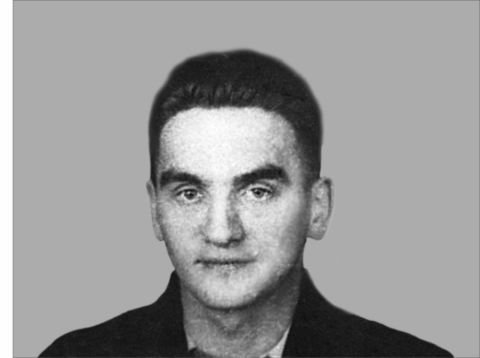Vladimir Antropov was born on April 25, 1920 at the Kochnevo station of the Novosibirsk Region. In 1937 he graduated from the Chelyabinsk school No. 1. While studying at school, he was fond of theatre and participated in performances. He was fond of literature, loved classical music, and knew the verses of many modern poets by heart. After finishing the school, he entered the Moscow Institute of Nonferrous Metals named after M.I. Kalinin. At the institute he was a Stalinist scholar, secretary of the Komsomol Committee of the faculty. In 1941, being a fourth-year student, he went to the army.
After the announcement of the beginning of the war, he immediately went to the military registration and enlistment office, hoping to get to the front. In the army he graduated from the Academy of Chemical Protection and taught there for a year. In 1943 he went to the front as the chief of artillery reconnaissance of the Second Belorussian Front, and was wounded several times. He celebrated the Victory Day in East Prussia on the Vistula Spit (German: Frische Nehrung). In the last heavy battle he was wounded and demobilized from the army in 1946. In the autumn of 1946, he arrived in Chelyabinsk and entered the 4th year of the Tank Faculty of the Chelyabinsk Mechanical Engineering Institute to continue his studies (in 1941 he completed the fourth year of studies at the Moscow Institute of Nonferrous Metals named after M.I. Kalinin). The same year he was elected secretary of the Party Bureau of the Tank Faculty.
In 1947 he graduated from the institute and was elected a member of the institute's Party Bureau, and from December 1950 he became its secretary. He was assigned the secretary of the Party Bureau for the second time in the 1945/1955 academic year.
The years from 1946 to 1949 was the period of the development and strengthening of the main faculties of the institute: the Automobile and Tractor Faculty (former the Tank Faculty, later the Faculty of Wheeled and Tracked Vehicles), and the Mechanical and Technological Faculty. Both were located in the school building on Timiryazeva Street and were the basis for preparing for the creation of the Chelyabinsk Polytechnic Institute (1951). During that period, Giprovuz (Moscow) designed the first stage of the buildings for the future Polytechnic Institute.
According to the Vladimir Antropov's recollections, qualified personnel from among specialists in science and production who had been evacuated to Chelyabinsk had to be replaced by new ones, capable not only of maintaining the level of educational and scientific work achieved by 1946, but also ensuring the transition of the team to fulfil new tasks set by the decree of the Council of Ministers of the USSR on the organization of the Chelyabinsk Polytechnic Institute. The focus of the administration of the university was constantly on the following questions:
- recruiting new personnel from among the specialists of the Chelyabinsk Tractor Plant, Chelyabinsk Ordzhonikidze Plant, workers of the Party and Soviet bodies of Chelyabinsk;
- training of postgraduate students of the main departments;
- recruiting scientists from Moscow, Leningrad, Sverdlovsk, and other scientific centres of the country;
- strengthening and expanding the creative community of science and industry on the basis of solving new problems of the post-war development of the national economy stge. After graduating from the postgraduate studies of the Leningrad Polytechnic Institute named after M.I. Kalinin in 1951-1954, he defended his thesis. Since 1954 he worked as Associate Professor, Candidate of Sciences (Engineering) in the Chelyabinsk Polytechnic Institute. He headed the Department of Mechanism and Machine Theory at the CPI.
From 1958 to 1985 he worked as director of the Design and Technological Institute for Automation and Mechanization of the Automotive Industry (KTIAM, Chelyabinsk). He combined his work at the design institute with teaching at the Department of Mechanism and Machine Theory.
He was awarded the Order of the Red Star, two Orders of the Red Banner of Labour, the Order of the Great Patriotic War of the 1st class, and many medals.




